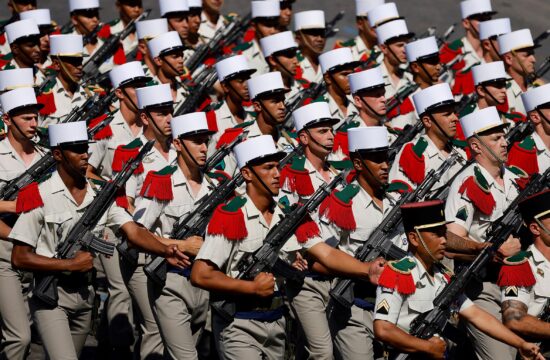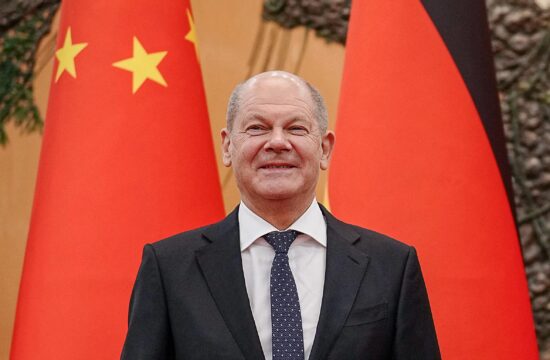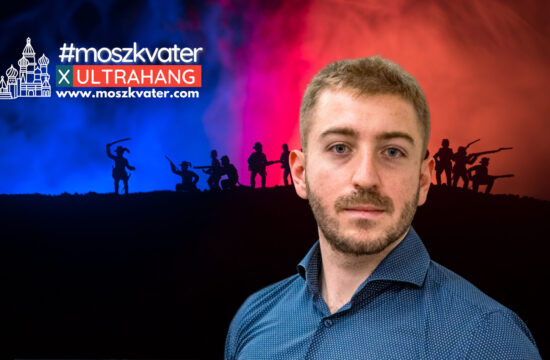This statement is a quote from the exclusive interview with Roger Hilton, a defence and security policy expert in GLOBSEC, a global think-tank based in Bratislava committed to promoting western values through enhancing security, prosperity and sustainability. The Canadian-born young researcher also spoke about his fascination with Central Europe; the background to the great powers’ rivalry and the technological developments in modern naval warfare. He also speaks about the importance of social media platforms as a tool for understanding international relations.

Photo:globsec.org
– Roger, as a native Canadian, what attracted you to the old continent?
– There are two kinds of Canadians – one who come to Europe as tourists, the other who come to Europe because of their roots here and are looking for a connection with the continent. I’m neither of those types. I was born into an English speaking Canadian family whose roots dated back so long to North America that I did not have an immediate family connection in Europe. While my first visit to Europe occurred when I was still in high school, visiting Russia for summer school when I was a young adult was transformational and expanded my mind on both on Europe and the EU.
– Yes, I read in your CV that you also studied at the Moscow State Institute of International Relations (MGIMO), how did you end up in Moscow and what was your experience there?
– This occurred in the summer of 2013. Prior to the that, I was studying Russian foreign policy and learned about how Andrei Kozyrev and Sergei Lavrov had attended MGIMO. I had no specific plans for the summer and looked into the University. I saw an advertisement of MGIMO for a summer university course in English. I didn’t hesitate as it aligned with my studies, I applied. I was accepted and the rest is history. I found myself in this very prestigious institution where the most languages are taught in the world, 53 full time languages during every academic term, most in any academic institution. MGIMO is the ‘Crème de la crème’ of international relations schools in the world, and it was here where I first heard learned the Diplomatic Academy of Vienna.
– Did you apply to Vienna directly after your MGIMO summer course?
– No, there was a year in between the places. I spent a year at home in Montreal working, but I had every intention of returning if I was accepted. I would say it was the best decision of my life, to study at the Diplomatic Academy in Vienna. On the one hand, I immediately fell in love with city’s Central European, multi-ethnic and extremely diverse culture, its architecture and the gastronomy of the region. It was an experience that transformed my personality, especially since I had come to Vienna as a Francophile. During the two years of the academy, I was able to travel all over Central and Eastern Europe, as well as multiple former Soviet republics. I gained a lot of personal and professional experience.
– When did you become a GLOBSEC researcher?
– It’s almost three years since I was recruited to the think-tank in Bratislava in 2019.
– Within GLOBSEC you do several types of work. On the one hand, you host the GLOBSEC Wire on GLOBSEC’s youtube channel, which is a variety geopolitical summary show. You also conduct interviews with security policy experts in Security Snapshots also on the renowned video sharing portal. In addition, your traditional written analysis is also available on various portals. How does this „influencer type analyst” work?
– Because of my age – I’m in my thirties now – I can’t say that I was born into the digital world that we live in now. When I was in high school, we had the internet which at the time was mind blowing. You can’t compare the digital world of the past and today. Although I admit that I do not use social media on a daily basis, I see it as a platform to successfully reach a lot of people. Nowadays there is an increasing struggle to catch and retain people’s attention who are more likely to absorb a short and concise message. In addition, our world has never been so complicated. So, now more than ever, it’s important to deliver messages that are as clear as possible. I believe that the majority of people today no longer read hundreds of pages of analysis about what is happening in international relations. Consequently, video is the best way to convey these ideas and engage with them. This is where the inspiration for the two programmes you mentioned comes from. In the Security Snapshot, I identify a pressing topic and allow the experts to explain its significance and provide their views. The special thing about GLOBSEC Wire is the visual aspects, there I am a narrator and the footage behind me tells the story.
– What you think about the relationship between Europe and Russia. At the moment it’s a gloomy one. But later could arise a situation whereby Russia and the EU could become strategic partners and possibly allies, or there will always be differences between the parties which prevent that?
– At the moment it’s not a cloudless relationship yet a situation could arise whereby Russia and the EU strategic partners could possibly become allies or there will always be those differences between the parties that prevent that. I cannot imagine the EU and Russia turning from rivals into allies in the long to medium term, which is worrying. The reason for this on the Russian side is that they have two different perceptions. One is at the level of power where they feel that Russia should be the centre of the world, an empire. They see their country as the ‘Third Rome’.
– Do you think this sense of uniqueness is popular among ordinary Russians?
– I don’t consider that all Russians in general think like that. But there’s an influential group, the current political and security elite as well as the champions of commerce, who does. This imperial thinking is what makes the cooperation with Russia almost impossible. I mean, if they think they are a special empire, they will not allow the West or anybody else telling them what to do. Of course, there is another group of Russian society that has realized the globalized setting we all inhabit within and the advantages of being ultra-connected. They know it is impossible to maintain this isolation of their country and this pursuit of imperialism. It is also a major problem for the current Russian state that it is unable or unwilling to acknowledge its past transgression during the Soviet Union. . Despite all the atrocities that Germany committed during the Second World War they have come admitted to their actions and remain activate in atoning for the past. I think this is a sign of maturity for any power. Another important difference is that Germany also treats smaller countries, like those in the European Union with respect and a source of strength
– Do you think that Russia does not show enough respect to its weaker states?
– What I see is that Russia still treats Georgia and Moldova, for example, as colonies and subservient states, where this perception extends to Ukraine. I am always in favor of dialogue, which is important to maintain because of the common threats, such as climate change and nuclear weapons. But I do not see any reason, in the short or even in the long term, why things could suddenly improve between the EU and Russia.
– Let’s bring China into this picture, which also has imperial ambitions. To this end, it has started to move closer to Russia. Do you think there is a real danger – or at least signs of it – that the two „Eastern Empires” will strategically ally themselves against the West, especially the US? How viable is this cooperation?
– I think the Sino-Russian rapprochement is just a marriage of convenience. I also think that this relationship of interest has its limits. The economic imperative is orienting them towards China. The Russians have no economic or strategic allies in Europe, except for some EU members who wish a more lenient approach vis-à-vis Moscow and the sanctions prevent a partnership with the West. However, it is clear that the Russians find it very difficult to accept that they are now the weaker player in the cooperation with China, which was not the case in the alliance between the Soviet Union and the People’s Republic of China.
– What about NATO, is the transatlantic alliance, EU-US relations, weakening or strengthening? As Slovak Foreign Minister, Ivan Korčok said at the latest Tatra Summit: the US seems to be letting go of the EU’s hand and is increasingly focusing on South East Asia.
– I need to reiterate that I am not saying this as a GLOBSEC researcher, but in my own personal capacity. I believe that many people are premature in declaring that Euro-Atlantic cooperation is over or heading in the wrong decision. All that has happened is that in the eyes of the US, after the Cold War, is that Europe is no longer the primary geopolitical flashpoint on the world stage. Europe is a peaceful, stable, economically self-sustaining region that does not need the tutelage of the US like it did during in the aftermath of the WWII It is natural that the US would migrate priority policies to Asia where there are much larger serious threats and the geopolitical stakes have never been higher.
– The EU may be less exposed economically, but the community is not capable of defending itself, including the lack of a common foreign and security policy strategy and no progress for nearly 30 years on the establishment of a common European army. What are your views on these?
– The European project, although more than 70 years old, is still so young and still in its infancy within the arc of European history. For this reason, it is natural for it to be a work in progress where obtaining true strategic autonomy and a common army are challenging policy exercises. But think about it, not even 100 years ago the continent’s states were fighting each other. So, I would say that everyone should lower their expectations a bit and be more patient. The most important thing is that NATO and the EU do not compete with each other in defense policy, but complement each other. In my view, the EU is trying to broaden its military repertoire of activities, especially in crisis management. While NATO’s function is to deter any attack against the continent. The Alliance currently protects the Baltics and all its member states that feel threatened. Since the EU’s governance structure is different to that of the USA, I recognize the legislative hardship in achieving comprehensive compromise to implement such far-reaching decisions as the creation of a common army. But I also think that in time, this and other major policy decisions will materialize. .
-Nevertheless, there are clear signs – such as the failed withdrawal from Afghanistan – that the US has turned its attention to the Asia-Pacific region and is concentrating its military forces there, culminating in the AUKUS, the trilateral defence agreement between Australia, Britain and the US. In light of this, the old allies can rightly feel themselves forgotten, are they not?
– I think it’s all about credibility in international relations and especially international security. If the United States wants to maintain its vast network of alliances and partnerships – which it has built up around the world – it must honor its agreements and commitments. As I mentioned earlier, Europe and with it Russia may no longer be a priority in US strategy, but the saying is still true: the US can chew gum and walk at the same time. The world’s number one power simply cannot afford to become untrustworthy in the eyes of its allies.
– Finally, let us talk about naval warfare. You have published an analysis on this topic. Why do you think this form of warfare has been revalued and what is the background to this? Where and with what means will the water wars of the future be fought?
– Basically, I would say that warfare within the maritime domain will once again become increasingly important. In the post 9/11 era, the role of land-based units, used during past invasions, is becoming less important and replaced by hybrid warfare and cyber warfare you observe the ongoing security trends, traditional conflicts are also shifting to the seas and oceans. In the recent past, such crisis hotspots have emerged in the Arctic, the Atlantic, the Mediterranean, the Black Sea, the Strait of Hormuz, and are steadily emerging in the Indian Ocean and South China Sea. Who controls these strategic trade routes and deep-sea mineral resources is important not only for military but also for civilian power. If the supply chains cannot function smoothly it has a very negative impact on the world economy. This is a factor of international security that is currently underestimated but growing in prominence. The second important point of naval warfare relates to the e North Atlantic, where millions of fibre-optic cables linking Europe and America lie. The Internet, or the ability to disrupt the flow of information, is a very serious matter and one that poses a major national security risk for all NATO allies. Naval warfare used to be concentrated on aircraft carriers and the deployment of various strike-measuring assets. Although those piece of equipment remain essential, developments in the field are moving a lightly fast as the Pentagon tests testing unmanned automated systems and vehicles that can operate without human control, that is, naval drones. Against the backdrop of the Pentagon’s Ghost Fleet programme and similar projects in other countries, I suppose in the long term there will be more unmanned vessels cruising the world’s seas than the ones which has crew on their decks.
♦














